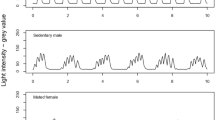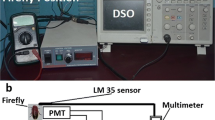Abstract
Fireflies are well known for the use of bioluminescence for sexual communication. In species using flash signals for pair formation, species and sexual identity are conferred by flash timing parameters such as flash duration, flash interval, flash number, and response delay. In dialog fireflies in North America, the male is the advertiser and the female is the responder. In these species, the male flash signal parameter varies depending on species, but the female flash signal parameter is limited only to response delay. However, in fireflies other than dialog fireflies, sexual flash communication is not well studied. Although many female-advertisement-like fireflies are reported, we have no confirmed case of sexual communication in a female-advertisement species. Here, we report the sexual flash communication of an Asian firefly, Luciola (Hotaria) parvula, in which the female flashes spontaneously. By using an electronic firefly, we confirm experimentally that males are specifically attracted to flashes with a female-specific flash duration. This is the first experimental report of sexual communication of a female advertiser in firefly communication. In this species, females call males usually with spontaneous flashes unlike dialog fireflies.



Similar content being viewed by others
Explore related subjects
Discover the latest articles and news from researchers in related subjects, suggested using machine learning.References
Ballantyne LA (1968) Revisional studies of Australian and Indomalayan Luciolini (Coleoptera:Lampyridae:Luciolinae). Papers Univ Qld Dep Entomol 2:105–139
Ballantyne LA, Buck E (1979) Taxonomy and behaviour of Luciola (Luciola) aphrogeneia, a new surf firefly from Papua New Guinea. Trans Am Entomol Soc 105:117–137
Branham MA, Greenfield MD (1996) Flashing males win mate success. Nature 381:745–746
Brunelli M, Magni F, Pellegrino M (1977) Excitatory and inhibitory events elicited by brief photic stimuli on flashing of the firefly Luciola lusitanica (Charp.). J Comp Physiol A 119:15–35
Buck J (1937) Studies on the firefly. II. The signal system and color vision in Photinus pyralis. Physiol Zool 10:412–419
Buck J, Case J (2002) Physiological links in firefly flash code evolution. J Insect Behav 15:51–68
Buschman LL (1984) Biology of the firefly Pyractomena lucifera (Coleoptera: Lampyridae). Fla Entomol 67:529–542
Carlson AD, Copeland J (1985) Communication in insects. I. Flash communication in fireflies. Q Rev Biol 60:415–436
Eguchi E, Nemoto A, Meyer-Rochow VB, Ohba N (1984) A comparative study of spectral sensitivity curves in three diurnal and eight nocturnal species of Japanese fireflies. J Insect Physiol 30:607–612
Kaufmann T (1965) Ecological and biological studies on the West African firefly Luciola discicollis (Coleoptera: Lampyridae). Ann Entomol Soc Am 58:414–426
Lewis SM, Cratsley CK (2008) Flash signal evolution, mate choice and predation in fireflies. Annu Rev Entomol 53:293–321
Lloyd JE (1966) Studies on the flash communication system in Photinus fireflies. Misc Publ Mus Zool Univ Mich 130:1–95
Lloyd JE (1971) Bioluminescent communication in insects. Annu Rev Eentomol 16:97–122
Lloyd JE (1973) A firefly inhabitant of coastal reefs in New Guinea (Coleoptera: Lampyridae). Biotropica 5:168–174
Lloyd JE (1983) Bioluminescence and communication in insects. Annu Rev Entomol 28:131–160
Mast SO (1912) Behavior of fire-flies (Photinus pyralis)? with special reference to the problem of orientation. J Anim Behav 2:256–272
McDermott FA (1911) Some further observations on the light-emission of American Lampyridae: the photogenic function as a mating adaptation in the Photinini. Can Entomol 43:399–406
McDermott FA (1917) Observations on the light-emission of American Lampyridae: the photogenic function as a mating adaptation. Can Entomol 49:53–61
McDermott FA (1964) The taxonomy of the Lampyridae. Trans Am Entomol Soc 90:1–72
Nelson S, Carlson AD, Copeland J (1975) Mating-induced behavioural switch in female fireflies. Nature 255:628–629
Ohba N (1983) Studies on the communication system of Japanese fireflies. Sci Rep Yokosuka City Mus 30:1–62
Papi F (1969) Light emission, sex attraction and male flash dialogues in a firefly, Luciola lusitanica (Charp.). Monit Zool Ital 3:135–184
Acknowledgment
This work was supported by grants-in-aid from the Ministry of Education, Culture, Sports, Science and Technology of Japan to J.Y., M.N. and K.T.
Author information
Authors and Affiliations
Corresponding author
Electronic supplementary material
Below is the link to the electronic supplementary material.
About this article
Cite this article
Takatsu, H., Minami, M., Tainaka, Ki. et al. Spontaneous flash communication of females in an Asian firefly. J Ethol 30, 355–360 (2012). https://doi.org/10.1007/s10164-012-0332-2
Received:
Accepted:
Published:
Issue Date:
DOI: https://doi.org/10.1007/s10164-012-0332-2




